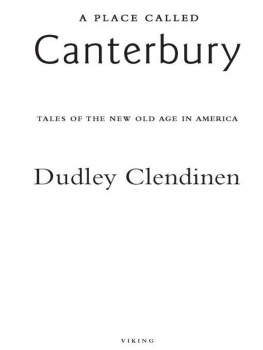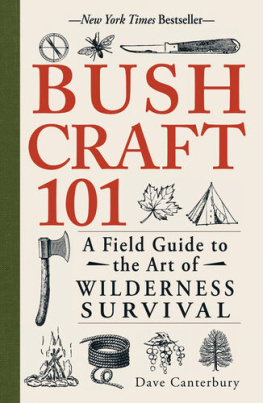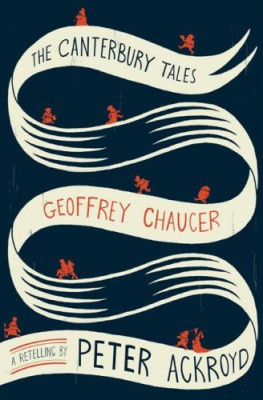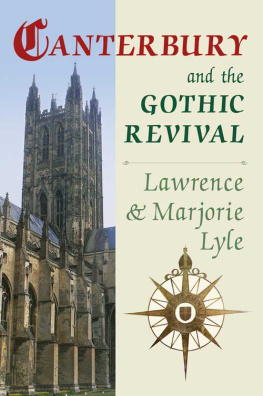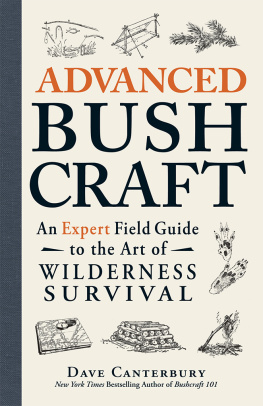ALSO BY DUDLEY CLENDINEN
Out for Good:The Struggle to Build a Gay Rights Movement in America (with Adam Nagourney)
The Prevailing South (as editor)
Homeless in America
(a book of photographs, edited by Michael A. W. Evans)
A PLACE CALLED
Canterbury
TALES OF THE NEW OLD AGE IN AMERICA
Dudley Clendinen
VIKING
Published by the Penguin Group
Penguin Group (USA) Inc., 375 Hudson Street, New York, New York 10014, U.S.A. Penguin Group (Canada), 90 Eglinton Avenue East, Suite 700, Toronto, Ontario, Canada M4P 2Y3 (a division of Pearson Penguin Canada Inc.) Penguin Books Ltd, 80 Strand, London WC2R 0RL, England Penguin Ireland, 25 St. Stephens Green, Dublin 2, Ireland (a division of Penguin Books Ltd) Penguin Books Australia Ltd, 250 Camberwell Road, Camberwell, Victoria 3124, Australia (a division of Pearson Australia Group Pty Ltd) Penguin Books India Pvt Ltd, 11 Community Centre, Panchsheel Park, New Delhi-110 017, India Penguin Group (NZ), 67 Apollo Drive, Rosedale, North Shore 0632, New Zealand (a division of Pearson New Zealand Ltd) Penguin Books (South Africa) (Pty) Ltd, 24 Sturdee Avenue, Rosebank, Johannesburg 2196, South Africa
Penguin Books Ltd, Registered Offices: 80 Strand, London WC2R 0RL, England
First published in 2008 by Viking Penguin, a member of Penguin Group (USA) Inc.
Copyright Dudley Clendinen, 2008
All rights reserved
Grateful acknowledgment is made for permission to reprint excerpts from My Darling Margy: The World War II Diaries and Letters of Surgeon Charles Francis Chunn, MD, edited by Celeste Chunn Colcord. 2005 The Scuppernong Press. By permission of Celeste Chunn Colcord.
LIBRARY OF CONGRESS CATALOGING-IN-PUBLICATION DATA
Clendinen, Dudley.
A place called Canterbury :tales of the new old age in America / Dudley Clendinen.
p. cm.
ISBN:978-1-4406-2948-8
Without limiting the rights under copyright reserved above, no part of this publication may be reproduced, stored in or introduced into a retrieval system, or transmitted, in any form or by any means (electronic, mechanical, photocopying, recording, or otherwise), without the prior written permission of both the copyright owner and the above publisher of this book.
The scanning, uploading, and distribution of this book via the Internet or via any other means without the permission of the publisher is illegal and punishable by law. Please purchase only authorized electronic editions and do not participate in or encourage electronic piracy of copyrightable materials. Your support of the authors rights is appreciated.
http://us.penguingroup.com
For my beloved Whitney, and for Christopher, with love,
from Grandmother, and from me
And for David Halberstam and David Rosenbaum,
who should have lived much longer
CONTENTS
INTRODUCTION
Canterbury and the New Old Age
In 1994, Mother finally relented and agreed to sell the brick and white clapboard house with a deep cedar-shingle roof, dormer windows, climbing ivy, and sheltering oaks that it had taken her twenty-two years to find, and in which she had lived for twenty-six years with my father, her beloved Jobie. Yes, she would move to Canterbury. She was not an impulsive woman. Boy, was she not. But he was dead. They had been married for forty-eight years. He was silver haired and pink and dignified, twinkly when he had a drink in his hand, and my mother had adored him. She was a romantic. She saw him as a Viking. She wanted to go up on his funeral pyre. Southern Methodists turned Episcopalian, however, dont get to heaven that way, and so Mother did the next best thing: arranged for a funeral service at St. Johns, with priests, acolytes, an organist, six pallbearers, twelve honorary pallbearers, Holy Communion, and a series of prayers and hymns calculated to put people on their knees, lift them up, andif all went wellreduce them to tears. At the end, as my fathers casket was carried down the aisle, amid much blinking and snuffling in the silence that followed My Country, Tis of Thee, Mother moved out the side door on her cane with a kind of sad, granite elegance, and made for the limousine, to follow the hearse to the cemetery at Myrtle Hill, where her parents were waiting. It was her family plot.
At the house afterward, surrounded by family and close friends, with everyone drinking and luncheon for thirty coming out of the kitchen, she looked radiant and content. Shes on a widows high, someone said, watching her. We were celebrating Jobie, and it made her glad. It is laterwhen the funeral lunch is done, the glasses and plates washed and put up, the friends departed, the notes and letters of condolence all readwhen the phone stops ringing with calls of love and concern and the children and grandchildren go back home, that depression sets in. Then, even if she is living in the city where she was born, as my mother was in Tampa, Florida, even if she has a daughter and son-in-law, two grandchildren, a maid twice a week, a yardman three or four times a month, and hundreds of friends and acquaintances there, as Mother still did, the widow is, for the first time in decades or generations, alone in her space. A lot of women, whatever their circumstances, fall apart then. A lot of men do, too.
I never once saw Mother weep. Im sure she did, but not in front of us. She never whined, never complained of feeling lonely. Never prattled on to us, to her friends, or to strangers about how darling and wonderful my father had been, and what a difference he had made. She filed all that away somewhere inside. She was strong. He was well known. And she knew better than to be a bore.
There were a few weeks of occasional damp-eyed silences. She didnt go out in public for a while, and when she did, her face sometimes crumpled for just an instant when she returned for the first time to someplace they had usually gone together. Otherwise, she seemed determined to carry on as before, with this difference: She was learning to drive, shop, cook, dole out pills, pay bills, and arrange life for one instead of two. To sit at the breakfast table in the bay window of the kitchen by herself in the morning, with just Larkspur, the parakeet, for company, looking out at the garage, which was sagging, and the terrace, which needed sweeping; to take her lunch into the little library with its couch and reading lamps and quiet bookshelves at midday, if she wasnt having lunch out somewhere; to carry her glass of iced vermouth into the softly breezy, green-and-white sunporch with its old wicker rocking chairs in the evening, where she could sit as they had at that hourand notice the cobwebs on the eaves outside. He wasnt there to tease and divert her, and absorb her attentions. It must have been hard, because Mother was very verbal, accustomed always to checking on Dad, feeding and watering and cheering him up.
Jobie, dear? I can hear her calling, room from room. JO-bie?
At night, often after cocktails and dinner out with old friends, she came home to the house, which was silent except for the hum of the window air conditioners in summer, and the soft chirping and chuckling of Larkspur. She would cover him. Lock the doors. Turn out most of the lights. Slowly climb the graceful stairs she loved so much. Pull herself into the golden four-poster bed she had gotten an old cabinetmaker to make for them forty years before. Open a book. Doze off. Sleep fitfully as the shadows of the branches outside the windows moved across her bedspread in the moonlight. Wake up alone.
No complaints. She didnt believe in it. She had always been equal to the occasion, whatever it might be. She was a southern woman of her generation, strong, resilient, skilled in finding a way to meet the need, without seeming to be looking. You can catch more flies with honey than with vinegar, darling, she told me once. But she knew how to be direct, too. When she became president of the Tampa YWCA in the mid-1960s, it was segregated. My father had supported integration on the editorial page since the Supreme Courts

